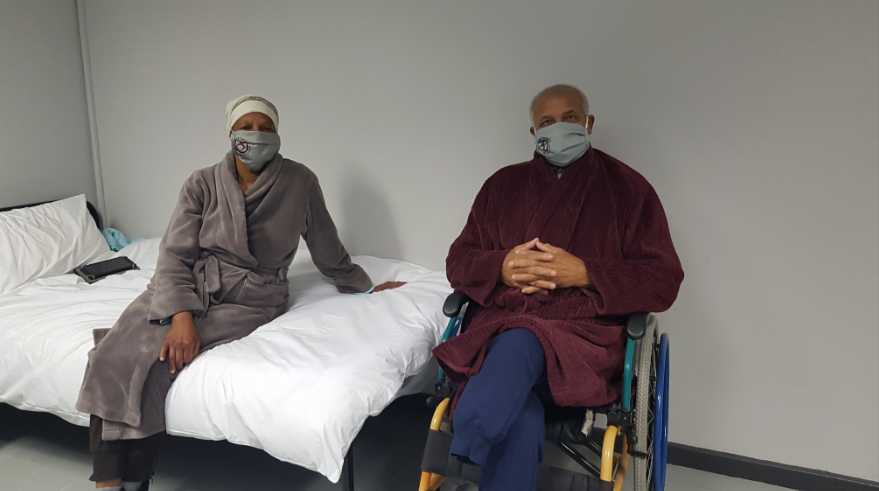Mr and Mrs Bruiners are an elderly couple who both tested positive for the coronavirus in the Western Cape. Rather than letting this situation get them down, the couple’s inevitable isolation brought them closer together.
Spending time in a COVID-19 isolation facility for a few days was like a second honeymoon according to 71-year-old Mrs Valerie Bruiners and 67-year-old Mr Jacob Bruiners from Surrey Estate. The time spent in isolation made the couple’s marital bond of 35 years even stronger.
Mr Bruiners is wheelchair-bound and suffers from diabetes and hypertension. He started having breathing difficulties at home which brought alarm bells to the family, who immediately took him to be tested for COVID-19 at the Kensington Clinic. Within 24 hours he received his results that he tested positive for COVID-19. The Western Cape Government Health Contact Tracing team discussed their options with them and they decided to arrange for Mr Bruiners to safely isolate at an isolation facility in the Cape Town metropole.
“I was very calm and did not panic when I found out I had the Coronavirus, because if you stress, then you will make yourself even sicker,” says Mr Bruiners
“The Department arranged for the Red Dot taxi to collect me, and I had to leave my wife behind because I could not safely isolate at home and I understood that it was the best decision for my family,” explains Mr Bruiners.
Mrs Bruiners volunteers to make food for a feeding scheme at a local community school and once her husband tested positive, she immediately informed the school and went to have herself tested for COVID-19. Her results came back positive.
Fortunately, she experienced no symptoms but was soon transported by the Red Dot taxi service to an isolation facility. The healthcare team discussed her options with her and they decided that it will be best for her to isolate with her husband.
“After all, it is not right for a wife to be in a strange place without her husband,” says Mrs Bruiners about her decision to isolate with her husband. “The staff were so helpful. They made arrangements to have me isolate in a double room with my husband,” says Mrs Bruiners.
“When I saw my wife, I felt so much better and was very happy that we could be together again, my spirit was lifted,” said Mr Bruiners. They were also supported by their loved ones. “Our family and friends sent us messages of support and love,” says the couple.
The Bruiners were provided with medication and were monitored daily by staff in case any complications presented. “We couldn’t complain of the service we received, and we were treated well and cared for by people who were genuinely concerned about our health,” recall the Bruiners.
“We received three healthy meals a day and it was so much food to eat that we decided to share meals and not waste the food by opening the second plate of food,” says the couple gratefully.
“We were not allowed to lock our bedroom doors in case our health deteriorates and then staff would not have access to assist us, but we felt safe because there were quite a few security guards around,” explains Mrs Bruiners.
“I am wheelchair-bound and because of the treatment I received at the facility, I can safely use a walker which I struggled using before,” says Mr Bruiners proudly.
“The place is wheelchair friendly, the staff are helpful and caring and the love I have for my wife grew even stronger. We bonded with each other and the place was peaceful. I have called this place ‘heaven’ because the staff wore white outfits, they treated us well, the other people using the service was friendly and everyone was laughing and made me feel comfortable,” says Mr Bruiners with laughter in his voice.
The Bruiners enjoyed their stay so much and wanted to stay longer even though their isolation period was coming to an end. When the couple arrived home, they were more cautious and even though family and friends wanted to visit, they requested that they receive no visitors in order to protect the vulnerable couple.
The “love birds” are enjoying life and are grateful to have recovered from COVID-19, despite their age and comorbidities.
Image: Supplied

